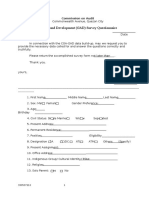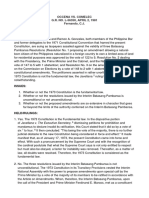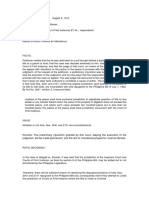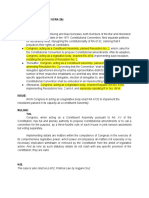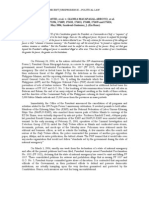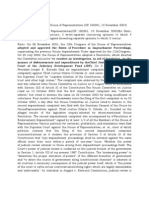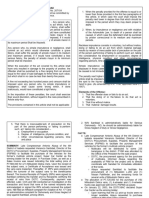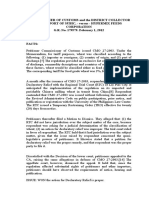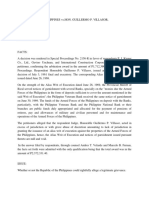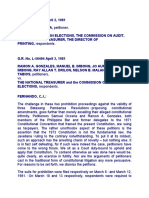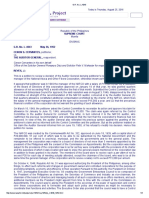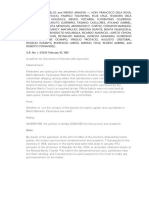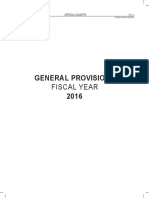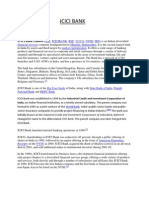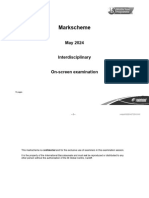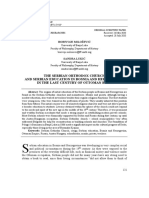0 ratings0% found this document useful (0 votes)
243 views002 Occena V COMELEC GR L-56350
002 Occena V COMELEC GR L-56350
Uploaded by
Taz Tanggol Tabao-SumpinganCopyright:
© All Rights Reserved
Available Formats
Download as DOCX, PDF, TXT or read online from Scribd
002 Occena V COMELEC GR L-56350
002 Occena V COMELEC GR L-56350
Uploaded by
Taz Tanggol Tabao-Sumpingan0 ratings0% found this document useful (0 votes)
243 views2 pagesOriginal Title
002 Occena v COMELEC GR L-56350.docx
Copyright
© © All Rights Reserved
Available Formats
DOCX, PDF, TXT or read online from Scribd
Share this document
Did you find this document useful?
Is this content inappropriate?
Copyright:
© All Rights Reserved
Available Formats
Download as DOCX, PDF, TXT or read online from Scribd
Download as docx, pdf, or txt
0 ratings0% found this document useful (0 votes)
243 views2 pages002 Occena V COMELEC GR L-56350
002 Occena V COMELEC GR L-56350
Uploaded by
Taz Tanggol Tabao-SumpinganCopyright:
© All Rights Reserved
Available Formats
Download as DOCX, PDF, TXT or read online from Scribd
Download as docx, pdf, or txt
You are on page 1of 2
Occea vs. COMELEC, G.R. No.
L-56350 April 2, 1981
Nature of the Action: prohibition proceedings against the validity of three
Batasang Pambansa Resolutions proposing constitutional amendments
Facts:
Petitioners, both members of the Philippine Bar and delegates to the 1971
Constitutional Convention that framed the present Constitution are asserting
that the present 1973 Constitution is not the fundamental law.
Issues:
1. Whether or not the present 1973 Constitution is the fundamental law
2. Whether or not the Interim Batasang Pambansa has the power to
propose amendments and how it may be exercised
3. Whether or not the amendments proposed are so extensive in
character that they are beyond the authority conferred on the Interim
Batasang Pambansa as successor of the Interim National Assembly
Ruling: petitions are dismissed for lack of merit
Ratio Decidendi:
1. In the dispositive portion of Javellana v. The Executive
Secretary, dismissing petitions for prohibition and mandamus to
declare invalid its ratification, the Supreme Court, by majority vote
concluded that there is not further judicial obstacle to the new
Constitution being considered in force and effect. It made manifest
that, as of January 17, 1973, the present Constitution came into force
and effect. Thereafter, as a matter of law, all doubts were resolved.
The 1973 Constitution is the fundamental law. Since then, the Supreme
Court has invariably applied the present Constitution.
2. The applicable provision in the 1976 Amendments is quite explicit.
Insofar as pertinent it reads thus: "The Interim Batasang Pambansa
shall have the same powers and its Members shall have the same
functions, responsibilities, rights, privileges, and disqualifications as
the interim National Assembly and the regular National Assembly and
the Members thereof." One of such powers is precisely that of
proposing amendments. The 1973 Constitution in its Transitory
Provisions vested the Interim National Assembly with the power to
propose amendments upon special call by the Prime Minister by a vote
of the majority of its members to be ratified in accordance with the
Article on Amendments.
3. The Interim Batasang Pambansa, sitting as a constituent body, can
propose amendments. In that capacity, only a majority vote is needed.
As to the requisite standard for a proper submission, the question may
be viewed not only from the standpoint of the period that must elapse
before the holding of the plebiscite but also from the standpoint of
such amendments having been called to the attention of the people so
that it could not plausibly be maintained that they were properly
informed as to the proposed changes. As to the period, the
Constitution indicates the way the matter should be resolved. There is
no ambiguity to the applicable provision: "Any amendment to, or
revision of, this Constitution shall be valid when ratified by a majority
of the votes cast in a plebiscite which shall be held not later than three
months after the approval of such amendment or revision."
You might also like
- G.R. No. L-28196. November 9, 1967 DigestDocument1 pageG.R. No. L-28196. November 9, 1967 DigestMaritoni Roxas0% (1)
- ANGARA Vs Electoral Commission Separation of PowerDocument4 pagesANGARA Vs Electoral Commission Separation of PowerIkkin100% (1)
- GAD Survey Questionnaire On Sexual HarassmentDocument8 pagesGAD Survey Questionnaire On Sexual HarassmentTaz Tanggol Tabao-SumpinganNo ratings yet
- Occena v. Comelec DIGESTDocument2 pagesOccena v. Comelec DIGESTKaren Feyt Mallari100% (2)
- Suability Vs LiabilityDocument2 pagesSuability Vs LiabilityJchelle DeligeroNo ratings yet
- Carbonilla vs. Board of Airlines RepresentativesDocument1 pageCarbonilla vs. Board of Airlines RepresentativesArahbells100% (2)
- Macariola v. AsuncionDocument2 pagesMacariola v. AsuncionVanityHughNo ratings yet
- PINZON - Air Transportation Office VS Spouses David Elisea RamosDocument2 pagesPINZON - Air Transportation Office VS Spouses David Elisea RamosKrisha Marie Carlos100% (3)
- Edu V. Ericta G.R. No. L-32096, October 24, 1970 FACTSDocument112 pagesEdu V. Ericta G.R. No. L-32096, October 24, 1970 FACTSkg_batac93No ratings yet
- 340 - Yokishazi Vs Joy Training CenterDocument2 pages340 - Yokishazi Vs Joy Training CenterTaz Tanggol Tabao-SumpinganNo ratings yet
- 330 Ortega V Leonardo 103 Phil 870Document2 pages330 Ortega V Leonardo 103 Phil 870Taz Tanggol Tabao-Sumpingan100% (2)
- 031 Barrameda Vs MoirDocument2 pages031 Barrameda Vs MoirTaz Tanggol Tabao-Sumpingan100% (3)
- 336 Hernandez v. CA, 160 SCRA 821Document2 pages336 Hernandez v. CA, 160 SCRA 821Taz Tanggol Tabao-Sumpingan50% (2)
- 051 Yu Cong Eng V Trinidad 271 US 500Document2 pages051 Yu Cong Eng V Trinidad 271 US 500Taz Tanggol Tabao-Sumpingan100% (1)
- Fule vs. CADocument1 pageFule vs. CAMae NavarraNo ratings yet
- Sanidad V ComelecDocument2 pagesSanidad V ComelecKingNo ratings yet
- Case Digest - Philippine Virginia Tobacco Association vs. Court of Industrial RelationsDocument2 pagesCase Digest - Philippine Virginia Tobacco Association vs. Court of Industrial RelationsJan Marie RamosNo ratings yet
- Case Digest: Imbong vs. COMELEC (35 SCRA 28)Document5 pagesCase Digest: Imbong vs. COMELEC (35 SCRA 28)Bea CapeNo ratings yet
- Us Vs Ang Tang Ho Case DigestDocument3 pagesUs Vs Ang Tang Ho Case Digestmelbertgutzby vivasNo ratings yet
- SHELL V JALOS Case DigestDocument2 pagesSHELL V JALOS Case DigestA M I R ANo ratings yet
- Veloso, Jr. V CA GR No.116680Document2 pagesVeloso, Jr. V CA GR No.116680Adfat Pandan0% (2)
- Jud Case DigestsDocument47 pagesJud Case DigestsJezen Esther PatiNo ratings yet
- David vs. ArroyoDocument5 pagesDavid vs. ArroyoDeus Dulay93% (15)
- 007 Tolentino Vs Comelec GR No L-34150Document1 page007 Tolentino Vs Comelec GR No L-34150Taz Tanggol Tabao-SumpinganNo ratings yet
- G.R. No. 160261. November 10, 2003 Digest (B)Document2 pagesG.R. No. 160261. November 10, 2003 Digest (B)Maritoni RoxasNo ratings yet
- 51 Antonio v. Sayman Vda. de MonjeDocument3 pages51 Antonio v. Sayman Vda. de MonjePao InfanteNo ratings yet
- 125 - Art 16 Sec 3 EPG Construction Vs VigilarDocument1 page125 - Art 16 Sec 3 EPG Construction Vs VigilarZandra Andrea GlacitaNo ratings yet
- POE vs. ARROYO RespondentDocument14 pagesPOE vs. ARROYO RespondentMoireeGNo ratings yet
- (CONSTI) Quimsing Vs TajanglangitDocument1 page(CONSTI) Quimsing Vs TajanglangitMarc VirtucioNo ratings yet
- Francisco V HRDocument4 pagesFrancisco V HRJayzell Mae FloresNo ratings yet
- 20 CONSTI1 - Ruffy V Chief of Staff Digest - Crisostomo (Executive)Document2 pages20 CONSTI1 - Ruffy V Chief of Staff Digest - Crisostomo (Executive)Bea CrisostomoNo ratings yet
- Festejo vs. Fernando PDFDocument2 pagesFestejo vs. Fernando PDFJona Carmeli Calibuso100% (2)
- Froilan v. Pan Oriental ShippingDocument2 pagesFroilan v. Pan Oriental Shippingxxxaaxxx100% (3)
- Chavez Vs JBC 676 SCRA 579, GR 202242 (July 17, 2012)Document12 pagesChavez Vs JBC 676 SCRA 579, GR 202242 (July 17, 2012)Lu CasNo ratings yet
- 655 Scra 476Document3 pages655 Scra 476Rica Marion DayagNo ratings yet
- EPG CONSTRUCTION v. VIGILARDocument1 pageEPG CONSTRUCTION v. VIGILARKingNo ratings yet
- 5 CREBA V ERCDocument4 pages5 CREBA V ERCMelchizedek Beton Omandam100% (1)
- ATO vs. SPOUSED DAVID Case DigestDocument2 pagesATO vs. SPOUSED DAVID Case DigestThea Barte100% (1)
- Tolentino Vs Secretary of Finance 1994Document4 pagesTolentino Vs Secretary of Finance 1994Carlota Nicolas VillaromanNo ratings yet
- Integrated Bar of The Philippines vs. Zamora: Statutory ConstructionDocument2 pagesIntegrated Bar of The Philippines vs. Zamora: Statutory ConstructionCarlota Nicolas Villaroman100% (1)
- PHILCONSA vs. Philippine Government - PREMATURITY - NOT RIPEDocument3 pagesPHILCONSA vs. Philippine Government - PREMATURITY - NOT RIPEJona Carmeli CalibusoNo ratings yet
- Imbong Vs ComelecDocument2 pagesImbong Vs ComelecChristian LabajoyNo ratings yet
- Miller Vs Mardo (112 Phil 792)Document7 pagesMiller Vs Mardo (112 Phil 792)Xennia Keizia FernandezNo ratings yet
- G3. Tobias v. Abalos 239 SCRA 106Document1 pageG3. Tobias v. Abalos 239 SCRA 106ImmediateFalcoNo ratings yet
- Consti2Digest - ACCFA Vs CUGCO, G.R. No. L-21484 (29 Nov 1969)Document1 pageConsti2Digest - ACCFA Vs CUGCO, G.R. No. L-21484 (29 Nov 1969)Lu CasNo ratings yet
- Philconsa vs. Enriquez G.R. No. 113105, August 19 1994, 235 SCRA 506Document2 pagesPhilconsa vs. Enriquez G.R. No. 113105, August 19 1994, 235 SCRA 506Carlota Nicolas Villaroman100% (1)
- (CRIM2) Ombudsman v. SantidadDocument6 pages(CRIM2) Ombudsman v. SantidadhannahlouiseleeNo ratings yet
- Belgica, Et. Al. vs. Ochoa, Et. Al., G.R. No. 208566Document5 pagesBelgica, Et. Al. vs. Ochoa, Et. Al., G.R. No. 208566Joshua Borres100% (1)
- Commissioner of Customs V Hypermix Feeds Corp.Document2 pagesCommissioner of Customs V Hypermix Feeds Corp.Elah ViktoriaNo ratings yet
- Santiago V BautistaDocument3 pagesSantiago V BautistaCistron ExonNo ratings yet
- Republic v. VillasorDocument2 pagesRepublic v. VillasorVanessa VelascoNo ratings yet
- PHILROCK Vs Board of LiquidatorsDocument2 pagesPHILROCK Vs Board of LiquidatorsRizh LobramonteNo ratings yet
- People V Perfecto Case DigestDocument1 pagePeople V Perfecto Case DigestJuds JD100% (1)
- Vera Vs Avelino Case DigestDocument1 pageVera Vs Avelino Case DigestConsigliere TadiliNo ratings yet
- People V. Perfecto, 43 Phil 887Document3 pagesPeople V. Perfecto, 43 Phil 887Jess MonterasNo ratings yet
- Daza V Singson Case DigestDocument2 pagesDaza V Singson Case DigestAra Belle0% (1)
- SENATE OF THE PHILIPPINES Vs ERMITADocument2 pagesSENATE OF THE PHILIPPINES Vs ERMITAEpalan Justine AngelicaNo ratings yet
- 018 Rodrigo V Sandiganbayan (CENIZA)Document2 pages018 Rodrigo V Sandiganbayan (CENIZA)Julius ManaloNo ratings yet
- GIRON vs. COMELEC (Digested)Document1 pageGIRON vs. COMELEC (Digested)Ryan Roco100% (1)
- Submitted By: Amoroso, Arriane Marie S. 2019400122Document10 pagesSubmitted By: Amoroso, Arriane Marie S. 2019400122Aira Amoroso100% (1)
- CONSTI Occena Vs ComelecDocument3 pagesCONSTI Occena Vs ComelecPafra BariuanNo ratings yet
- Occeña v. COMELEC DigestDocument2 pagesOcceña v. COMELEC DigestBryan EyaNo ratings yet
- Occena Vs Comelec (G.R. No. 56350, April 2, 1981)Document11 pagesOccena Vs Comelec (G.R. No. 56350, April 2, 1981)Francis Gillean OrpillaNo ratings yet
- 06 Occena V ComelecDocument8 pages06 Occena V ComelecCarmela Lucas DietaNo ratings yet
- Digest - Occena Vs COMELECDocument2 pagesDigest - Occena Vs COMELECkvnjnNo ratings yet
- OCCENA v. ComelecDocument10 pagesOCCENA v. ComelecVeah CaabayNo ratings yet
- Reengineering ReinventingDocument4 pagesReengineering ReinventingTaz Tanggol Tabao-SumpinganNo ratings yet
- Reengineering Government - Tabao, A and Tabao, TDocument4 pagesReengineering Government - Tabao, A and Tabao, TTaz Tanggol Tabao-SumpinganNo ratings yet
- 02 CENA Vs CSCDocument3 pages02 CENA Vs CSCTaz Tanggol Tabao-SumpinganNo ratings yet
- Astorga Vs VillegasDocument5 pagesAstorga Vs VillegasTaz Tanggol Tabao-SumpinganNo ratings yet
- 01 Beronilla Vs GSISDocument1 page01 Beronilla Vs GSISTaz Tanggol Tabao-SumpinganNo ratings yet
- Report - Reengineering GovernmentDocument2 pagesReport - Reengineering GovernmentTaz Tanggol Tabao-SumpinganNo ratings yet
- Cervantes Vs Auditor GeneralDocument3 pagesCervantes Vs Auditor GeneralTaz Tanggol Tabao-SumpinganNo ratings yet
- 04 Profeta V DrilonDocument3 pages04 Profeta V DrilonTaz Tanggol Tabao-SumpinganNo ratings yet
- People Vs PerfectoDocument6 pagesPeople Vs PerfectoTaz Tanggol Tabao-SumpinganNo ratings yet
- 016 MORELOS, Et Al. Vs de La RosDocument1 page016 MORELOS, Et Al. Vs de La RosTaz Tanggol Tabao-SumpinganNo ratings yet
- 343 Diwa Vs Donato 234 S 608Document2 pages343 Diwa Vs Donato 234 S 608Taz Tanggol Tabao-SumpinganNo ratings yet
- 012 Dumlao Vs Comelec 95 SCRA 392Document2 pages012 Dumlao Vs Comelec 95 SCRA 392Taz Tanggol Tabao-Sumpingan0% (1)
- Tijam V Sibonghanoy GR No. L-21450Document2 pagesTijam V Sibonghanoy GR No. L-21450Taz Tanggol Tabao-Sumpingan100% (2)
- 6 - Vda de Rigonan V DerechoDocument10 pages6 - Vda de Rigonan V DerechoTaz Tanggol Tabao-SumpinganNo ratings yet
- 023 People vs. Munar - Nov. 19, 2016Document2 pages023 People vs. Munar - Nov. 19, 2016Taz Tanggol Tabao-SumpinganNo ratings yet
- Peralta Vs Director of PrisonsDocument28 pagesPeralta Vs Director of PrisonsTaz Tanggol Tabao-SumpinganNo ratings yet
- 077 Nha V Reyes 123 Scra 245Document2 pages077 Nha V Reyes 123 Scra 245Taz Tanggol Tabao-Sumpingan100% (1)
- 079 Punsalan V Municipal Board of ManilaDocument1 page079 Punsalan V Municipal Board of ManilaTaz Tanggol Tabao-SumpinganNo ratings yet
- 007 Tolentino Vs Comelec GR No L-34150Document1 page007 Tolentino Vs Comelec GR No L-34150Taz Tanggol Tabao-SumpinganNo ratings yet
- Consti Cases 1 To 5Document36 pagesConsti Cases 1 To 5Taz Tanggol Tabao-SumpinganNo ratings yet
- Gaa 2016 GenproDocument23 pagesGaa 2016 GenproTaz Tanggol Tabao-SumpinganNo ratings yet
- Contra Judaeus 2 Exposing Jewish PsychopoliticsDocument78 pagesContra Judaeus 2 Exposing Jewish PsychopoliticsVenezNo ratings yet
- The Emphasised Bible New Tastament 1878Document522 pagesThe Emphasised Bible New Tastament 1878rgrg100% (2)
- Nature of Organizational BehaviorDocument4 pagesNature of Organizational Behaviorpratiksha140390% (10)
- Shoppersstop ReportDocument44 pagesShoppersstop ReportAnkit GehlotNo ratings yet
- ABS-CBN Broadcasting Corp. v. TajanlangitDocument21 pagesABS-CBN Broadcasting Corp. v. TajanlangitJerome OppusNo ratings yet
- 7 P's of ICICI BANKDocument13 pages7 P's of ICICI BANKSumit VishwakarmaNo ratings yet
- Mime PosterDocument4 pagesMime PosterMandeep GrewalNo ratings yet
- Lecture 4 2016 ALMDocument70 pagesLecture 4 2016 ALMEmilioNo ratings yet
- M24 Interdisciplinary Markscheme English 1Document14 pagesM24 Interdisciplinary Markscheme English 1poojaditya1823No ratings yet
- Gilpin Robert G. - No One Loves A Political RealistDocument26 pagesGilpin Robert G. - No One Loves A Political RealistNikos PapadosNo ratings yet
- Contemporary ART: Contemporary Arts From The Philippine RegionsDocument30 pagesContemporary ART: Contemporary Arts From The Philippine RegionsjhomalynNo ratings yet
- Project On Bpo IndustryDocument63 pagesProject On Bpo Industrysamiuzzaman ansariNo ratings yet
- OceanofPDF.com the Secret Library - Kekla MagoonDocument266 pagesOceanofPDF.com the Secret Library - Kekla Magoonmanahil1050No ratings yet
- Criminal Procedure1Document31 pagesCriminal Procedure1Frederick EboñaNo ratings yet
- TitleDocument2 pagesTitleAvi SinghNo ratings yet
- Elaf-Company ProfileDocument11 pagesElaf-Company ProfileElaf cargoNo ratings yet
- Research Lesson 4 5 and 6Document22 pagesResearch Lesson 4 5 and 6richardalesnadiotayjrNo ratings yet
- (En) BGF 2024 - 2025 - Explanatory NoteDocument9 pages(En) BGF 2024 - 2025 - Explanatory NoteCHANN SOCHEATANo ratings yet
- Describing TablesDocument1 pageDescribing TablesKusal DamsaraNo ratings yet
- Milošević Lukić Serbian Education BosniaDocument19 pagesMilošević Lukić Serbian Education BosniaelfifdNo ratings yet
- Tender Supply and Installation of Gym Equipments Delhi 02 03 2016Document14 pagesTender Supply and Installation of Gym Equipments Delhi 02 03 2016PIYUSH GARGNo ratings yet
- Group Assignment Analyzing Financial Statement of VinamilkDocument24 pagesGroup Assignment Analyzing Financial Statement of VinamilkNhư ThảoNo ratings yet
- Sample Engagement Letters and Fee AgreementsDocument14 pagesSample Engagement Letters and Fee AgreementsSimone RobinsonNo ratings yet
- English Revolution HistoriographyDocument7 pagesEnglish Revolution HistoriographyayushNo ratings yet
- CCAS SolarlistDocument9 pagesCCAS SolarlistSairaj ChaudhariNo ratings yet
- 20 PrologueDocument40 pages20 PrologueJihane DahanNo ratings yet
- Facebook Case StudyDocument16 pagesFacebook Case StudyWarren VanName100% (2)
- 3 PDFDocument5 pages3 PDFraymuel belarminoNo ratings yet
- OBV BloodGoodDocument4 pagesOBV BloodGoodOnur ARIKNo ratings yet
- CHP597 - FOX615 Multiservice Platform Advanced FeaturesDocument2 pagesCHP597 - FOX615 Multiservice Platform Advanced FeaturesMichael Parohinog GregasNo ratings yet


